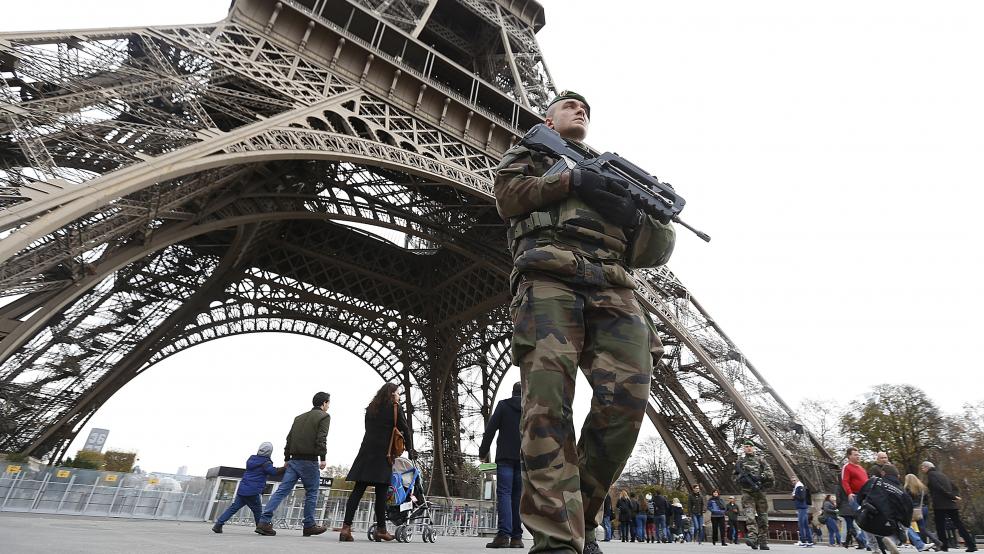One day after the 9/11 attacks killed thousands of Americans in New York, Washington, D.C., and Pennsylvania, the member states of the North Atlantic Treaty Organization formally agreed to the request from the George W. Bush administration that Article 5 of NATO’s founding treaty be invoked. Article 5 is the foundation of the NATO alliance, because it requires all of the member nations to treat an act of war against one as an act of war against all.
Historically, NATO’s mutual defense treaty has been a powerful deterrent. The alliance was first formed in 1949, in the wake of the Second World War. Before the 2001 terror attacks in the U.S., Article 5 had never been invoked.
Related: Bush – U.S. Should Accept Only ‘Christian’ Refugees from Syria
However, in the wake of Friday’s terrorist attacks in Paris, which left more than 130 people dead and hundreds more wounded, the NATO alliance may face another decision about whether to recognize a member nation’s invocation of Article 5.
The attacks are widely believed to have been the work of the terror group ISIS, which is trying to establish an Islamic state in the Middle East. French President Francois Hollande left no room for doubt about how the government in Paris views the multiple assaults at various public venues around the city. He described them plainly as an act of war.
France is currently in the midst of a three-day period of national mourning. But by Sunday, French warplanes were already pounding facilities in Raqqa, Syria, where ISIS is believed to have its headquarters. Hollande has vowed to mount a “merciless” assault on ISIS.
“We will work alongside our allies to fight this terrorist menace,” he said. “France is strong and even if she is wounded she will get up always and nothing will hold her down, even if we are feeling the grief now.”
Related: Obama Readies Biggest Reach of Presidential Power Yet
Many have speculated that the next step for the government in Paris is invocation of Article 5 which if recognized by the member states would obligate them to provide military assistance to France in its efforts against ISIS.
The language of the treaty seems to leave little doubt that the Paris attacks are a sufficient cause to invoke the mutual defense element:
“The Parties agree that an armed attack against one or more of them in Europe or North America shall be considered an attack against them all and consequently they agree that, if such an armed attack occurs, each of them, in exercise of the right of individual or collective self-defense recognized by Article 51 of the Charter of the United Nations, will assist the Party or Parties so attacked by taking forthwith, individually and in concert with the other Parties, such action as it deems necessary, including the use of armed force, to restore and maintain the security of the North Atlantic area.”
How the U.S. would react to an invocation of Article 5 is unclear, though it seems beyond question that substantial military support for France would be immediately forthcoming.
Related: With ISIS Making Millions, U.S. Boosts Its Attacks on Oil Fields
On Sunday, White House Deputy National Security Adviser Ben Rhodes reiterated sentiments expressed by numerous U.S. officials, noting that France is the United States’ oldest ally and promising that the United States would stand shoulder to shoulder with France in reaction to the Paris attacks.
However, when asked whether Article 5 would be invoked, he repeatedly pointed out that the decision to seek a formal invocation of the mutual defense treaty is up to the French government.
While that is technically true, it didn’t stop candidates for the U.S. presidency from calling for the invocation of Article 5.
“This is clearly an act of war and an attack on one of our NATO allies, and we should invoke Article 5 of the NATO agreement, and bring everyone together to put together a coalition to confront this challenge,” said Florida Sen. Marco Rubio, who is angling for the GOP’s presidential nomination.
Related: Why Hillary Clinton Should Keep Her Distance from Obama’s Policies
“Just as France did for us in aftermath of the infamous 9/11 attacks, we should invoke Article 5, the mutual defense clause of the North Atlantic Treaty,” said Ohio Gov. John Kasich, one of Rubio’s rivals for the GOP nomination.
Contra Rubio and Kasich, the U.S. cannot unilaterally invoke Article 5 – under NATO convention, the country subjected to attack does that. However, the language out of France in the aftermath of the terror attacks suggests that NATO will invoke the key commitment underpinning the alliance very soon.





